Resource Center
The Transit Workforce Center is pleased to host a curated collection of publications and other materials to assist stakeholders engaged in transit workforce development. The Resource Center includes case studies, training materials, research reports, and other materials of interest, including publications produced by federal government agencies, transit organizations, and independent research entities. Resources may be filtered by topic, resource type, and transit mode. This TWC blog post explains how to use the Resource Center.
We are continuing to update the Resource Center regularly. Please contact us via the Request Help menu option if you would like assistance using the Resource Center or are looking for resources on a particular topic. We also welcome suggestions of topics or specific resources to add.
Content in external resources linked from the Resource Center is solely the responsibility of the resource authors and does not necessarily reflect the perspectives of or endorsement by the Transit Workforce Center.
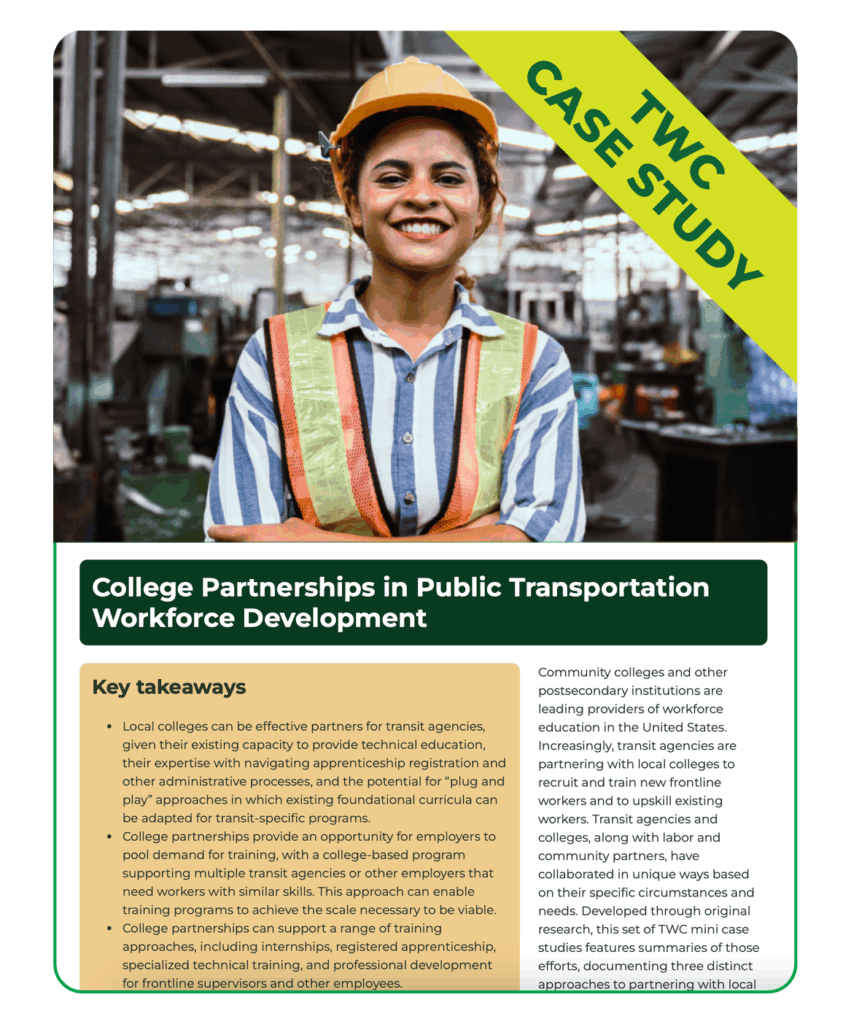
College Partnerships in Public Transportation Workforce Development
Community colleges and other postsecondary institutions are leading providers of workforce education in the United States. Increasingly, transit agencies are partnering with local colleges to recruit and train new frontline workers and to upskill existing workers. Transit agencies and colleges, along with labor and community partners, have collaborated in unique ways based on their specific circumstances and needs. Developed through original research, this set of TWC mini case studies features summaries of those efforts, documenting three distinct approaches to partnering with local colleges.
Transit Workforce Center
September 2025
LEARN MORE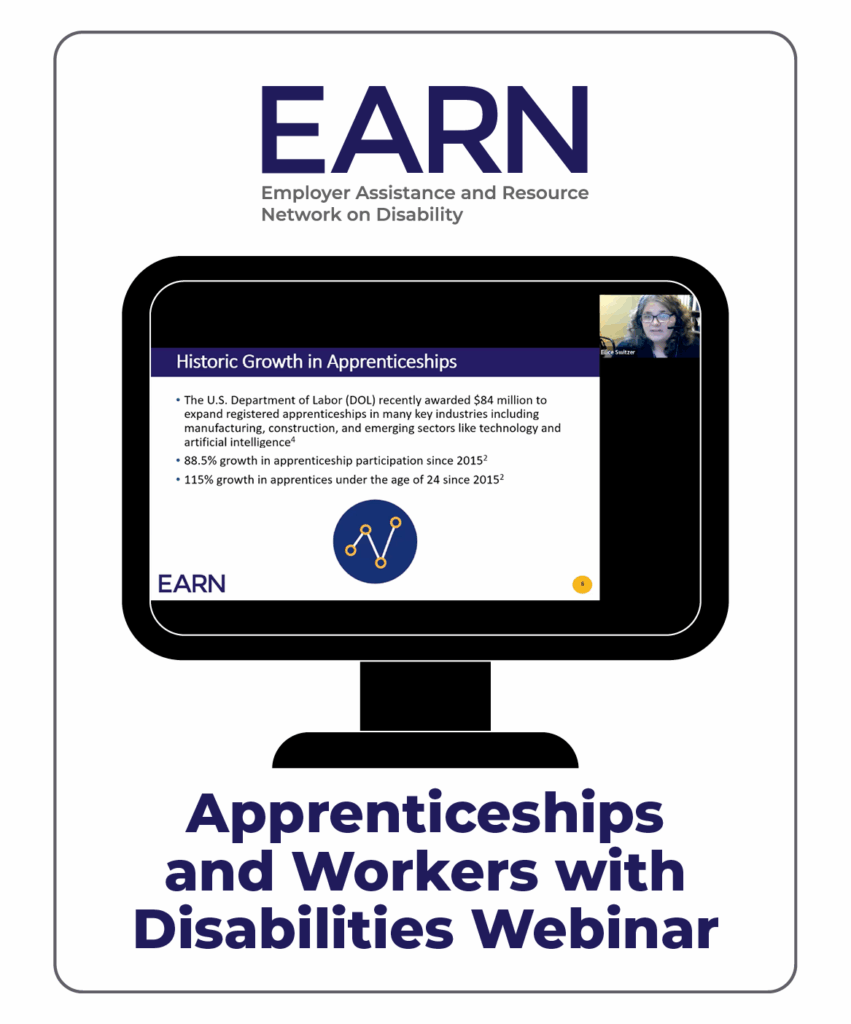
Apprenticeships and Workers with Disabilities Webinar
This webinar recording details practical strategies for recruiting and supporting apprentices with disabilities, as well as where to find recruitment resources and how to develop partnerships to build a talent pipeline.
Employer Assistance and Resource Network on Disability
August 2025
LEARN MORE
Paid apprenticeships combine education and on-the-job training to prepare workers for long-term career success. By ensuring that all qualified candidates, including those with disabilities, have an opportunity to access apprenticeship opportunities, employers benefit from a broader pool of qualified workers. This webinar recording details practical strategies for recruiting and supporting apprentices with disabilities, as well as where to find recruitment resources and how to develop partnerships to build a talent pipeline. It also highlights a case example of a manufacturing business that credits its partnership with a local community-based organization serving jobseekers with disabilities with saving the local business.
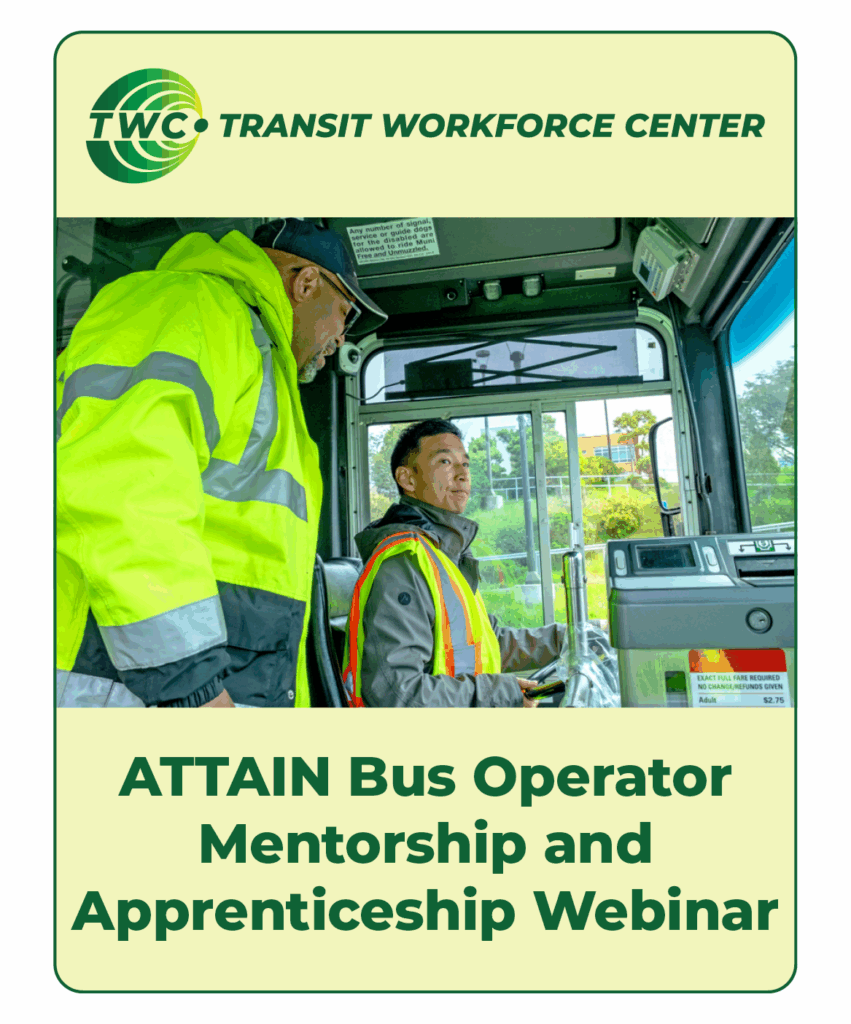
ATTAIN Bus Operator Mentorship and Apprenticeship Webinar
This webinar featured presenters from Greater Richmond Transit Company (GRTC)/ATU Local 1220 in Virginia and Champaign-Urbana Mass Transit District (MTD) in Illinois.
Transit Workforce Center
July 2025
TOPICS: Apprenticeship, Career Pathways, Community Engagement, Labor-Management Partnerships, Mentorship
This webinar featured presenters from Greater Richmond Transit Company (GRTC)/ATU Local 1220 in Virginia and Champaign-Urbana Mass Transit District (MTD) in Illinois.
- GRTC and ATU Local 1220 partnered to implement a mentorship program for their bus operators that launched in 2024. Presenters will describe that process, how the program has grown, and the benefits that it has provided.
- MTD launched its bus operator mentorship program in 2023 and has tracked metrics showing the program’s impact. Responding to both quantitative measures and qualitative feedback and observations, MTD is working to restructure the program to better meet the needs of the transit agency and the bus operators participating in the program as mentees or mentors.
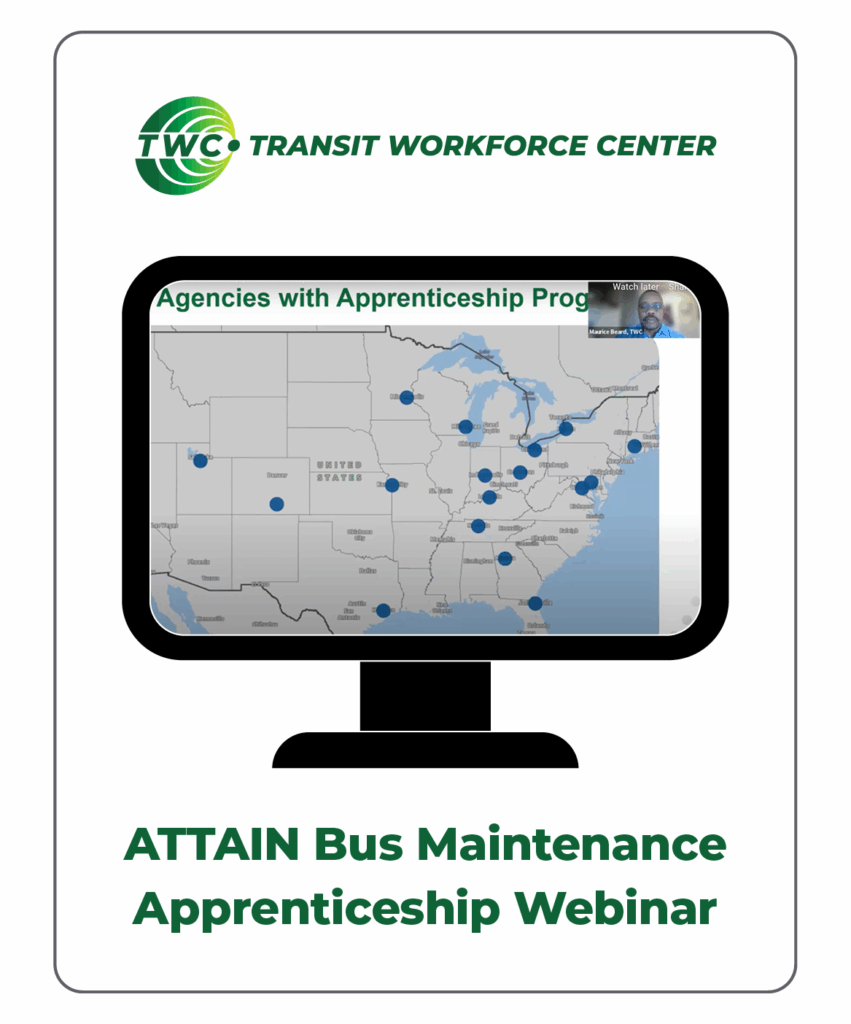
ATTAIN Bus Maintenance Apprenticeship Webinar
This ATTAIN webinar focused on bus maintenance apprenticeship programs and featured Milwaukee County Transit System/Amalgamated Transit Union Local 998 and Jacksonville Transit Authority/International Association of Machinists and Aerospace Workers Lodge 759. Panelists from these transit agencies and labor unions outlined the development process and the final structure of their apprenticeship programs while highlighting how this strategy was implemented and why it works, offering benefits for both the agency and the workforce.
Transit Workforce Center
May 2025
LEARN MORE
This ATTAIN webinar focused on bus maintenance apprenticeship programs and featured Milwaukee County Transit System/Amalgamated Transit Union Local 998 and Jacksonville Transit Authority/International Association of Machinists and Aerospace Workers Lodge 759. Panelists from these transit agencies and labor unions outlined the development process and the final structure of their apprenticeship programs while highlighting how this strategy was implemented and why it works, offering benefits for both the agency and the workforce.
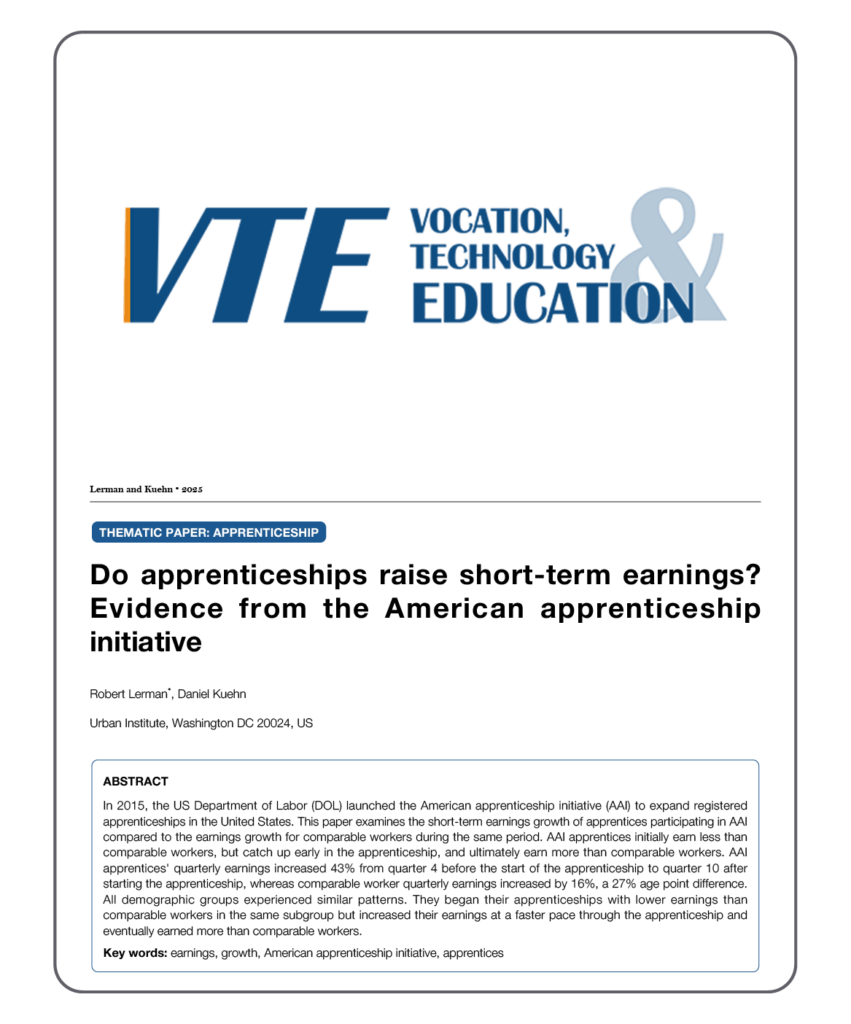
Do apprenticeships raise short-term earnings? Evidence from the American apprenticeship initiative
Vocat Tech Edu.
May 2025
LEARN MORE
This paper examines the short-term earnings growth of apprentices participating in the American apprenticeship initiative (AAI) compared to the earnings growth for comparable workers during the same period. Researchers found that AAI apprentices initially earn less than comparable workers, but catch up early in the apprenticeship, and ultimately earn more than comparable workers.
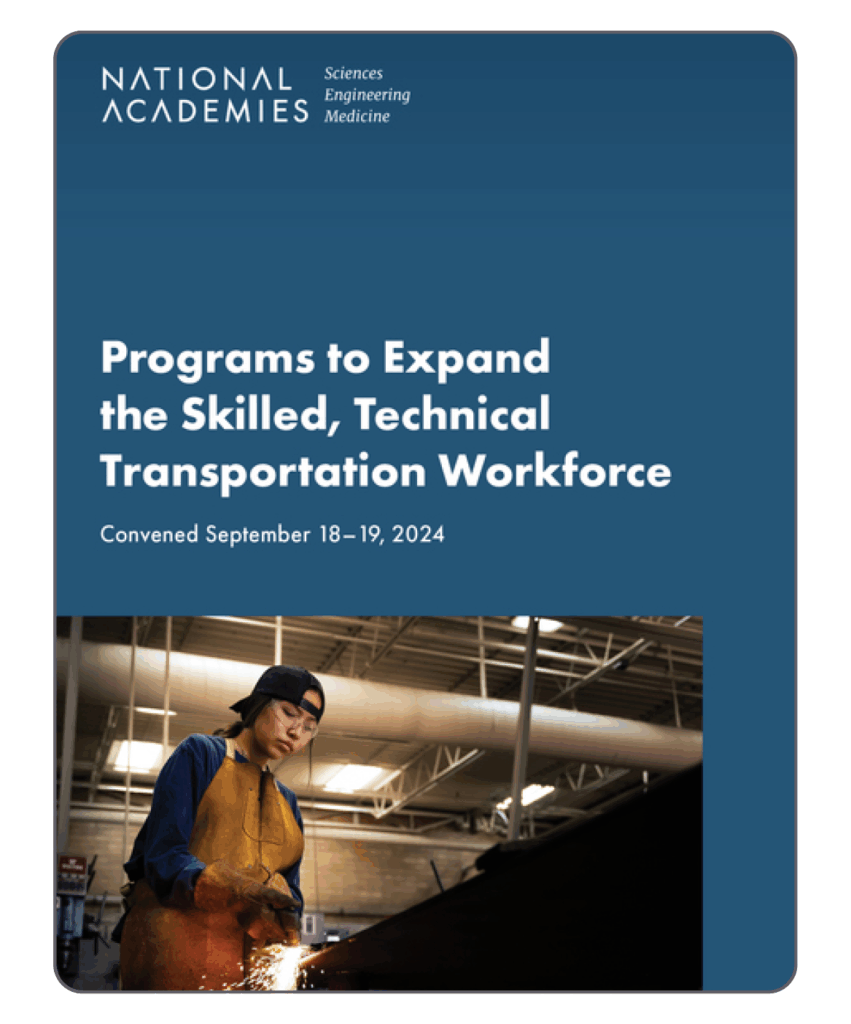
Programs to Expand the Skilled, Technical Transportation Workforce
Programs to Expand the Skilled, Technical Transportation Workforce: Proceedings of a Workshop summarizes the Workforce held in September 2024 at the National Academies of Sciences Building in Washington, DC. The workshop was sponsored by the Federal Transit Administration and the National Science Foundation and brought together experts and educators across academia, government, and industry.
National Academies of Sciences Engineering and Medicine
March 2025
TOPICS: Apprenticeship, Career Pathways, Community Engagement, Hiring and Recruitment, Policy and Planning, Workforce Shortage
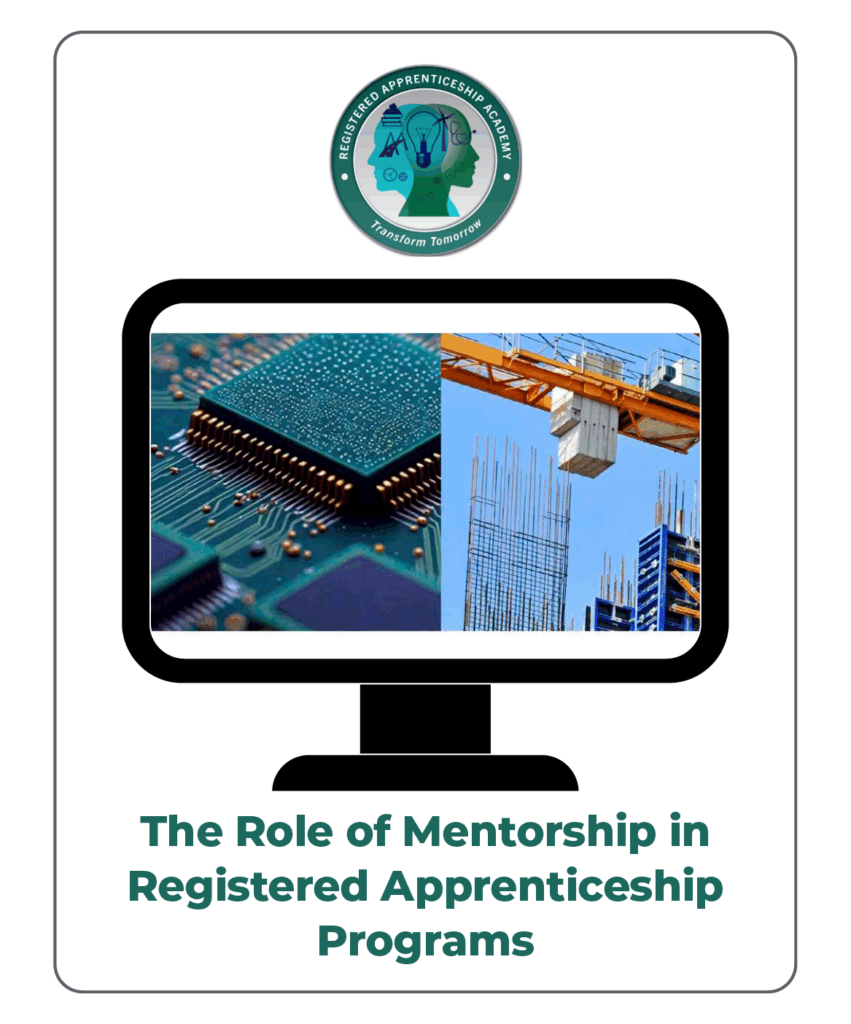
The Role of Mentorship in Registered Apprenticeship Programs
This E-learning module introduces how mentorship is essential to registered apprenticeship programs. Best practices for selecting, training, and supporting mentors are included to support registered apprenticeship program sponsors and participating employers.
Registered Apprenticeship Academy
January 2025
LEARN MORE
This E-learning module introduces how mentorship is essential to registered apprenticeship programs. Best practices for selecting, training, and supporting mentors are included to support registered apprenticeship program sponsors and participating employers. The objectives for this course are:
- Identify the responsibilities of sponsors to provide mentorship.
- Describe the role of mentors.
- Recognize why mentorship is important to a successful registered apprenticeship program.
- Employ strategies for mentorship to create a culture of support and guidance for workers throughout their registered apprenticeship.
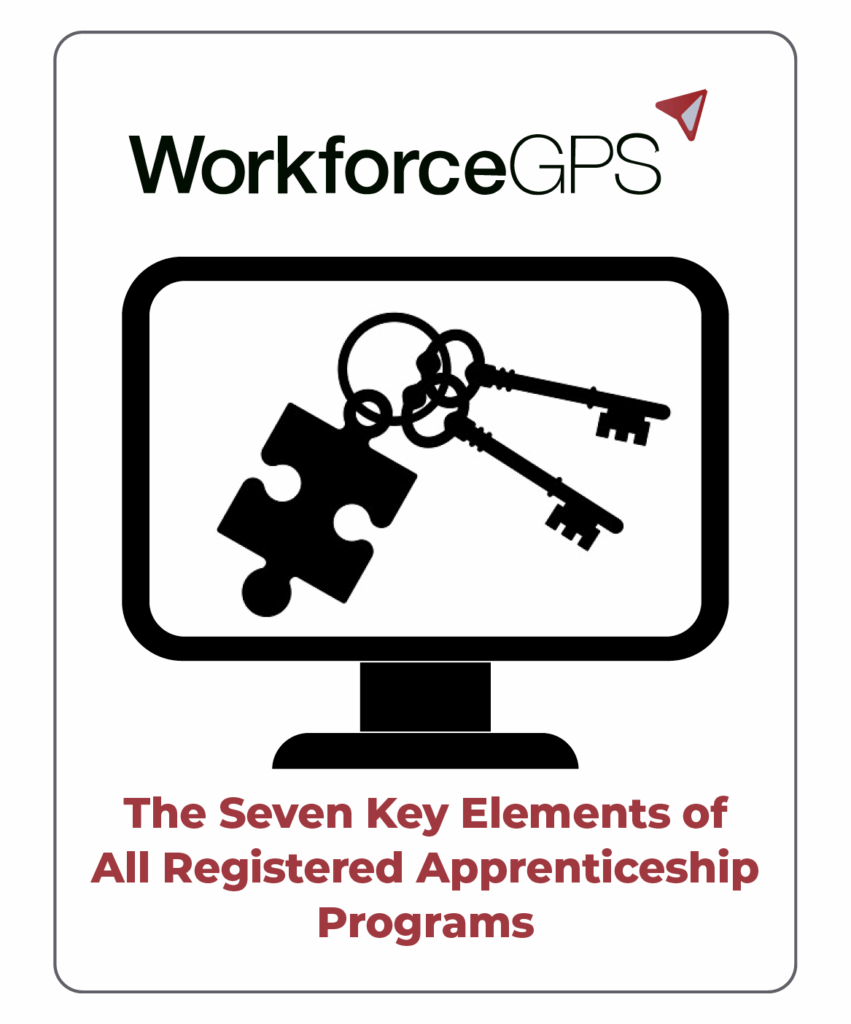
The Seven Key Elements of All Registered Apprenticeship Programs
Registered Apprenticeship is an industry-driven pathway to high-quality careers where employers can develop and prepare their future workforce, and individuals can obtain paid work experience; progressive wage increases; classroom instruction; and a portable, nationally recognized credential. The U.S. Department of Labor recently updated the way we describe Registered Apprenticeship Programs to reflect the worker safety elements embedded in those programs.
Workforce GPS
January 2025
LEARN MORE
Registered Apprenticeship is an industry-driven pathway to high-quality careers where employers can develop and prepare their future workforce, and individuals can obtain paid work experience; progressive wage increases; classroom instruction; and a portable, nationally recognized credential. The U.S. Department of Labor recently updated the way we describe Registered Apprenticeship Programs to reflect the worker safety elements embedded in those programs.






 CLEAR
CLEAR

